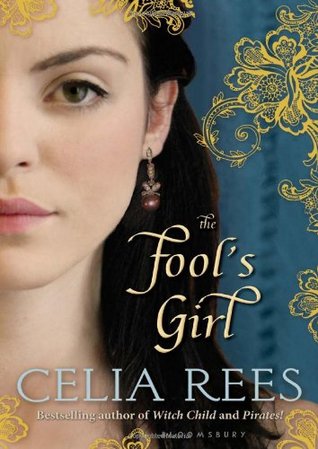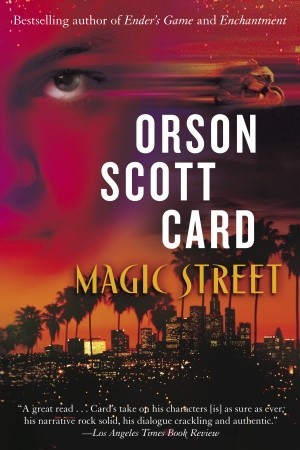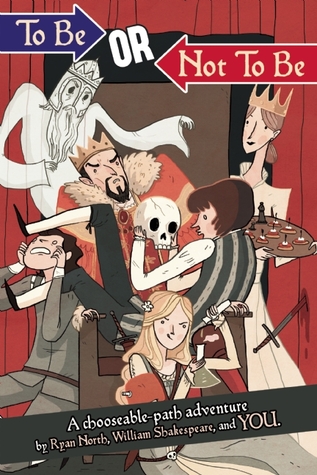I recently finished
The Shakespeare Stealer by Gary L. Blackwood. It was a fun read, with likeable characters, good historical detail, and plenty of suspense and plot twists, though there was one twist that went too far, in my opinion. This prompted me to think about some of the other Shakespearean-inspired books I've read, and I decided to compile a list of them for you. (Yay!) Brevity is the soul of wit, so I'll try to
briefly outline each book and give my opinion on it, but, judging from my previous posts, I have a tendency to go the Polonius route and write way more than I thought I would.
Historical Shakespeare

Title: Loving Will Shakespeare
Author: Carolyn Meyer
Date of Publication: October 1st 2006
Publisher: HMH Books for Young Readers
In all the stories told about William Shakespeare, there is usually one vitally important person who is either omitted or glossed over, and that is his wife, Anne Hathaway. Married to Will Shakespeare at an older age and because she was pregnant, Anne was left to raise their children in Stratford-upon-Avon while her husband went to London and became a famous playwright. How heartbreaking and lonely it must have been for her when their only son died and his father was absent. It's all but impossible for us to know what the relationship between Shakespeare and his wife was really like, but I like to think that the facts present a long-standing, long-suffering marriage with a passionate beginning and a serene ending, though there may have been some rocky patches in the middle.
Loving Will Shakespeare tells Anne Hathaway's side of the story, focusing on her teenage and early-adult years up to the moment of her marriage with Will. It is a historically informative novel that tries to get at the heart of one of the most interesting and ambiguous romances in all of history. For Anne, Will is not the famous playwright; he is simply the kind, spirited childhood friend who makes her laugh. But to the rest of the world he is the famous playwright, and Anne will find that loving him is not always easy. I only have good things to say about this book. I enjoyed the characters, the story, and the setting, and I learned a lot about Shakespeare's childhood and his home, as well as about the girl who would eventually become his wife.
Loving Will Shakespeare is a lively historical romance with a bittersweet ending.

Title: The Shakespeare Stealer
Author: Gary L. Blackwood
Series: The Shakespeare Stealer
Date of Publication: July 1st 2000
Publisher: Puffin
My review of Gary Blackwood's The Shakespeare Stealer is not quite as glowing as my review of Carolyn Meyer's novel. I felt that The Shakespeare Stealer had a very promising start; I was completely hooked for the first half of the book. When Widge, an orphan from the English countryside, is ordered by his owner to steal Shakespeare's play Hamlet, the stakes are high. His attempts continually foiled, he has to keep returning night after night to the Globe Theatre to try again, and if he fails, there's no knowing what his grim and violent owner will do to him. When Widge meets the members of Shakespeare's company and gets taken into their little "family," the stakes get even higher. If his owner finds him without the script of Hamlet in his possession, it could mean a beating or even death, but if his new-found friends find out that he's trying to steal their play, it will mean being cast out of the only family Widge has ever known. The stakes are indeed high, and Widge is caught squarely in the middle of two devastating decisions. But then, suddenly, somewhere around the middle leading into the second half of the book, a major plot twist threw me out of the action, and I just didn't care as much about the book after that. It may have been a twist in the story, but it was a cliché in the larger realm of Shakespearean retellings and similar stories, and it was an unreality in the historical Shakespeare's time period. So, while I appreciate the way that the author lead up to this particular twist and made the rest of the story consistent with it, I just found it so cliché and unrealistic that I couldn't get back into the story after it happened. However, it was still a fairly good story and it was definitely historically informative; I don't think I've read any other Shakespearean novel that dealt so much with the specific members of his acting company.

Title: The Fool's Girl
Author: Celia Rees
Date of Publication: July 20th 2010
Publisher: Bloomsbury USA Childrens
The Fool's Girl, by Celia Rees, is both a historical fiction about Shakespeare himself and a reimagining of one of his best-loved comedies, Twelfth Night. This novel picks up where the story of Twelfth Night leaves off, introducing Violetta, the daughter of Viola and Orsino, as the new heroine. When her home is destroyed, Violetta flees to London with her companion, Feste, and the two outcasts encounter William Shakespeare and his acting company, who agree to help the pair face off against their arch-nemesis, Malvolio. This book was doubly fun, because it gave me historical Shakespeare and a fantasy on one of his plays. The portrayal of Shakespeare in this novel is one of my favorite characterizations of the Bard; I found him likeable, clever, caring, and adventurous - in other words, everything that I like to think the real William Shakespeare actually was. And hey, Anne Hathaway was in this book! Not for very long, but still, I was excited! It's a fun adventure with sympathetic characters and plenty of historical detail.
More recent historical Shakespeare

Title: Oregon Shakespeare Festival
Author: Kathleen F. Leary and Amy E. Richard
Series: Images of America
Date of Publication: September 9th 2009
Publisher: Arcadia Publishing (SC)
It may just be because I really love the Oregon Shakespeare Festival, but I really enjoyed reading this book. It's not a novel, but a nonfiction compilation of the origins, development, and subsequent history of the Oregon Shakespeare Festival located in Ashland, Oregon. It's very informative and interesting, and it has great pictures, too.
Rewriting Shakespeare

Title: Rosencrantz and Guildenstern are Dead
Author: Tom Stoppard
Date of Publication: January 21st 1994
Publisher: Grove Press
Premiered: 24th August 1966, Edinburgh Fringe Festival, Scotland
Tom Stoppard's tragicomic play
Rosencrantz and Guildenstern are Dead is the author's rewriting, from a slightly different viewpoint and in a different literary style, of Shakespeare's
Hamlet. Stoppard uses the two tangential characters of Rosencrantz and Guildenstern to raise questions about language, literature, intertextuality, and the secret lives of an author's characters. Goodreads says this about it: "
Hamlet told from the worm's-eye view of two minor characters, bewildered Rosencrantz and Guildenstern. Echoes of Waiting for Godot resound, reality and illusion mix, and where fate leads heroes to a tragic but inevitable end." (Wait, did that make sense to you? Because it didn't to me.) Stoppard's play is witty, hilarious, dark, deep, and uncomfortable. And yes, they die at the end. Now don't you want to go read it?
Reimagining Shakespeare

Title: Magic Street
Author: Orson Scott Card
Date of Publication: June 27th 2006
Publisher: Del Rey
Who ever thought that Shakespeare's classic comedy A Midsummer Night's Dream would be retold someday by a famous science-fiction writer who would set the story in a modern African American neighborhood in Los Angeles, California? I never would have thought it up. But it's great! The book is a lot of fun, and the story and characters interact with Shakespeare's original play in fun and interesting ways. It's a gripping story, well-told, with spunky, loveable characters. If you've ever wondered what a Shakespeare play told by Orson Scott Card would be like, here you go. A word of caution, though, there is a scene that's PG-13. You have been warned. If you end up liking Magic Street, you might want to check out Card's similar (but I think better) foray into the world of fantasy, Enchantment. It is also PG-13.
Random Fun Shakespeare
Title: To Be or Not To Be: A Chooseable-Path Adventure
Author: Ryan North & William Shakespeare (and, apparently, YOU)
Date of Publication: September 10th 2013
Publisher: Breadpig (who the heck are they?)
I have not read this book, but it looks awesome. Apparently it's a cross between Hamlet and Choose Your Own Adventure. The title alone is the greatest thing ever.

Title: The Shakespeare Encyclopedia
Author: A.D. Cousins (Editor)
Date of Publication: September 17th 2009
Publisher: Firefly Books
This volume contains information about Shakespeare's life, each of his plays, and his poetry. It has beautiful full-color illustrations on just about every page. Basically it is the be-all and end-all of everything Shakespeare related.
If none of these works piqued your interest, there's a whole world of Shakespearean-related books that I haven't even touched on, because I haven't read them. Whether you want a non-fiction biography, a collection of Shakespeare's own writings, or a fantasy on some of his themes, there's something out there for you. Because, for William Shakespeare, all the world's a stage.

















